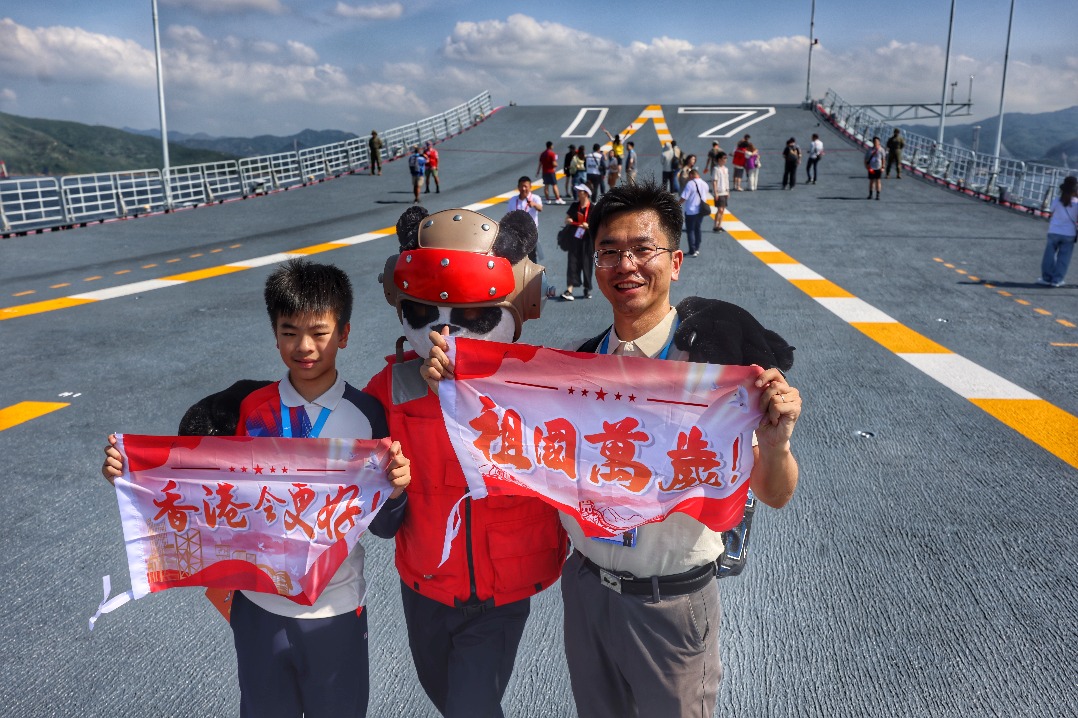Focus on environment brings lucid waters to capital

Standing on the shore of the Grand Canal amid a breeze that rippled the water body, Han Kefei marveled at the significant changes that have happened to the section of the river in her hometown of Tongzhou district in Beijing.
"People used to avoid approaching it because of its permanent stench for an extended period of time since the 1980s," the 61-year-old recalled, her eyes glancing at the lucid water in the river and the leaves that have turned yellow and red on its shore.
Back then, the water in it was black and there were no plants at all within a meter of the shore, she told a group of reporters participating in a media tour to Tongzhou on Friday, which was organized by the general office of the Standing Committee of the National People's Congress.
An annual event launched in 1993, the media tour this year is themed "Implementing Xi Jinping Thought on Ecological Civilization, using the force of the law to protect the ecology and environment".
Ecological civilization is a concept promoted by President Xi Jinping for balanced and sustainable development that features harmonious coexistence between humanity and nature.
As a deputy to the Beijing Municipal People's Congress for 25 years, Han has been closely following the treatment of the water body and is keenly aware of the reasons behind the great transformation in the river.
The legislature in Beijing has not only drafted a series of laws and regulations to enhance environmental protection, but also kept amending them to address emerging problems, she noted.
Investigation tours for legislators are organized to ensure these laws and regulations are properly implemented, she continued, adding she has personally participated in such tours to the canal "a particularly large number of times".
One of the major factors to blame for lingering environmental problems in the Tongzhou section of the canal was the overlapping responsibilities of different government bodies in pollution control, she said, but the problems have been addressed following persistent attention from the legislature.
Han said what made treatment of the section challenging was also that, located in one of the lowest-lying areas in Beijing, it used to receive a large amount of sewage brought by rainwater from across the capital's plain area after downpours.
"Once the canal's section in Tongzhou is good, it means that water pollution across the capital has been well treated," she said, indicating the remarkable environmental improvement across the capital.
Han was greatly endorsed by officials with Beijing's environmental and forest management authorities.
"The ecological and environmental protection efforts in Beijing have seen historic changes," said Chen Tian, head of Beijing Municipal Ecology and Environment Bureau.
In 2021, the water quality of 75.2 percent of river sections in the capital reached Grade III and better, up 25.4 percentage points from 2013, he said, adding lucid water with visible fish and green shores have been a common sight in the capital.
China has a five-tier quality system for surface water, with Grade I the best.
Chen highlighted air quality improvement as another example of the historic changes. Last year, the average density of PM2.5 particulate matter in Beijing reached 33 micrograms per cubic meter, down 63 percent from 2013, the first year the capital started to monitor the air pollutant.
In the first three quarters this year, the average concentration of PM2.5 in the capital declined to 28 mcg per cubic m, 15.2 percent lower compared with the same period in 2021, he added.
The capital has also been increasingly greener thanks to the government's afforestation, according to Wang Xiaoping, an official with the Beijing Municipal Forestry and Parks Bureau.
Since 2013, over 161,300 hectares of forest have been planted in Beijing, with most of them in plain areas, he said. This has helped increase forest coverage in the capital from 38.6 percent to 44.6 percent by the end of last year.
The decadelong effort has made it a lot easier for residents to access forested areas. Currently, residents in 87.8 percent of the capital's urban areas can reach such green spaces within 500 meters of their homes, he said.
The increased forest coverage has greatly contributed to biodiversity conservation and climate change mitigation, Wang continued.
Forests in Beijing absorbed 8.4 million metric tons of carbon dioxide from the atmosphere last year, which is equivalent to annual emissions from 2.8 million cars, he noted.
With 596 species of wild animals, Beijing now only comes second to Brasilia among capitals of G20 members, he said, adding the metropolis also boasts 2,088 wild plant species.
"In the next stage, we are going to build Beijing into a capital of biodiversity, and we have a very solid foundation for the goal thanks to the efforts in the past 10 years," he said.
- China builds barrier against desert expansion
- Guizhou dismantles most small hydropower stations to help aquatic ecosystem's health
- Meeting in Wuxi to shape future of Asia-Pacific aquaculture
- Reassessing main Eastern battlefield's role vital to safeguarding peace today
- China, Myanmar, Thailand hold ministerial-level meeting on telecom and cyberspace
- Prado in virtual reality






































